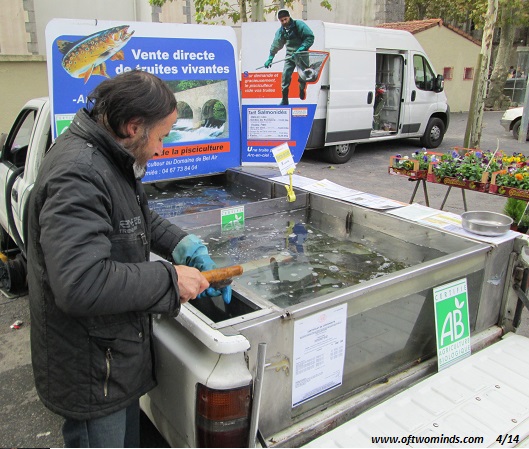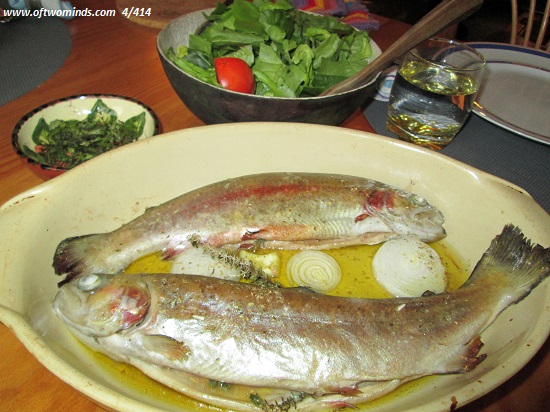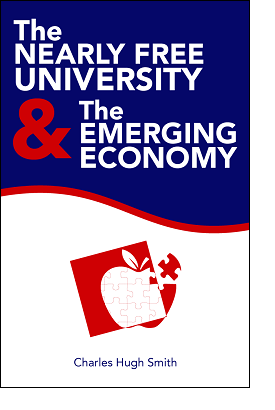What's Cooking at Our House: Local Aquaculture Trout
For those who like to fish, and to consume fish, the agenda is pretty clear.
Enacting regulations to protect the environment, society and the economy is all well and good, but there are limits on that solution. Regulations are worthless if unenforced, or if enforced only on the marginalized. Second, enforcing regulations on a global scale is essentially impossible; every nation has to voluntarily restrict destructive activity, generally because cooperation yields benefits and non-compliance generates high costs.
The other way to change things is to change the consumer demand. Sellers will stop selling things consumers no longer buy and seek to supply what consumers want.
This is the basic idea behind think globally, act locally.
The earth's oceans are being stripmined to harvest a small slice of oceanic life with a high market value. Please read The Consequences of Oceanic Destruction (Foreign Affairs) for a summary of the situation.
One way each individual can act is to stop participating in the destructive consumption/demand. This is akin to pulling your money out of parasitic Wall Street and Too Big To Fail banks. Some will say that has no effect, but they are wrong: once the actions of individuals are aggregated, each decision to stop participating becomes consequential.
For those who like to fish, and to consume fish, the agenda is pretty clear: protect the wild fisheries so there will be a sustainable fishery to harvest, and substitute sustainable local aquaculture fish for wild-caught fish when the wild fisheries are endangered by overfishing/stripmining by trawlers.
When we visited our French family last October, we dined on locally raised organic trout. Here is the local entrepreneur who raises the trout and transports them to the local farmer's market in a truck-mounted tank to sell. Note the sign that read AB--this means the trout are raised according to the European Union's standards for organic fare:agriculture biologique.

Here are the prepared fresh trout. Very simple prep: onions and herbs, salt to taste. Delicious.

Why do I say that A healthy homecooked family meal and a home garden are revolutionary acts? In a consumer economy based on artifice, insecurity, scarcity and inauthenticity, producing and preparing real food in a communal activity is revolutionary simply because it is the real deal, i.e. it is authentic and cannot be commoditized.
The Nearly Free University and The Emerging Economy:
The Revolution in Higher Education
Reconnecting higher education, livelihoods and the economyWith the soaring cost of higher education, has the value a college degree been turned upside down? College tuition and fees are up 1000% since 1980. Half of all recent college graduates are jobless or underemployed, revealing a deep disconnect between higher education and the job market.
It is no surprise everyone is asking: Where is the return on investment? Is the assumption that higher education returns greater prosperity no longer true? And if this is the case, how does this impact you, your children and grandchildren?

We must thoroughly understand the twin revolutions now fundamentally changing our world: The true cost of higher education and an economy that seems to re-shape itself minute to minute.
The Nearly Free University and the Emerging Economy clearly describes the underlying dynamics at work - and, more importantly, lays out a new low-cost model for higher education: how digital technology is enabling a revolution in higher education that dramatically lowers costs while expanding the opportunities for students of all ages.
The Nearly Free University and the Emerging Economy provides clarity and optimism in a period of the greatest change our educational systems and society have seen, and offers everyone the tools needed to prosper in the Emerging Economy.
Read Chapter 1/Table of Contents
print ($20) Kindle ($9.95)
Things are falling apart--that is obvious. But why are they falling apart? The reasons are complex and global. Our economy and society have structural problems that cannot be solved by adding debt to debt. We are becoming poorer, not just from financial over-reach, but from fundamental forces that are not easy to identify. We will cover the five core reasons why things are falling apart:
 1. Debt and financialization
1. Debt and financialization2. Crony capitalism
3. Diminishing returns
4. Centralization
5. Technological, financial and demographic changes in our economy
Complex systems weakened by diminishing returns collapse under their own weight and are replaced by systems that are simpler, faster and affordable. If we cling to the old ways, our system will disintegrate. If we want sustainable prosperity rather than collapse, we must embrace a new model that is Decentralized, Adaptive, Transparent and Accountable (DATA).
We are not powerless. Once we accept responsibility, we become powerful.
Read the Introduction/Table of ContentsKindle: $9.95 print: $24
| Thank you, Andy G. ($50), for your monumentally generous contribution to this site -- I am greatly honored by your support and readership. | Thank you, Tristam W. ($50), for your extraordinarily generous contribution to this site -- I am greatly honored by your steadfast support and readership. |



























